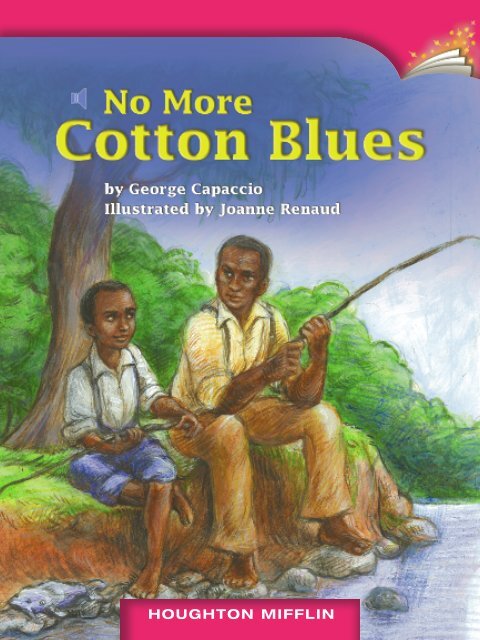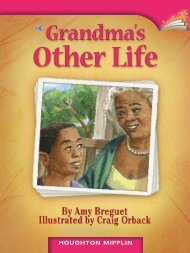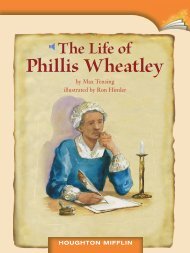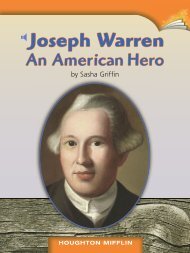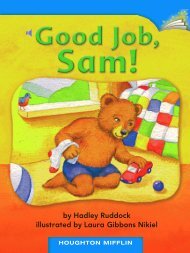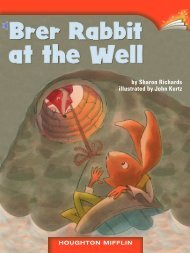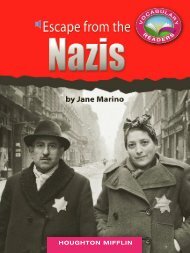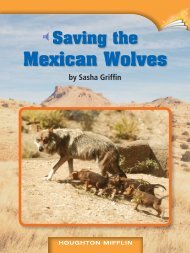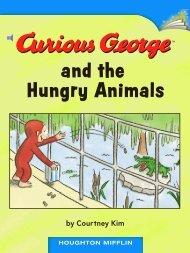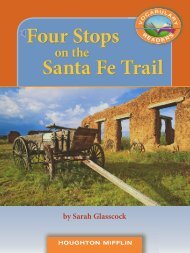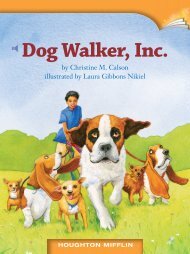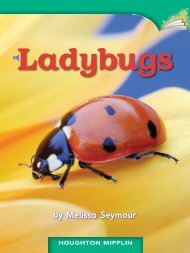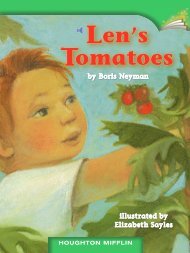Lesson 23:No More Cotton Blues
Lesson 23:No More Cotton Blues
Lesson 23:No More Cotton Blues
Create successful ePaper yourself
Turn your PDF publications into a flip-book with our unique Google optimized e-Paper software.
HOUGHTON MIFFLIN
y George Capaccio<br />
Illustrated by Joanne Renaud<br />
Copyright © by Houghton Mifflin Harcourt Publishing Company<br />
All rights reserved. <strong>No</strong> part of this work may be reproduced or transmitted in any form or by any means, electronic or<br />
mechanical, including photocopying or recording, or by any information storage and retrieval system, without the prior<br />
written permission of the copyright owner unless such copying is expressly permitted by federal copyright law. Requests<br />
for permission to make copies of any part of the work should be addressed to Houghton Mifflin Harcourt School Publishers,<br />
Attn: Permissions, 6277 Sea Harbor Drive, Orlando, Florida 32887-6777.<br />
Printed in China<br />
ISBN-13: 978-0-547-02198-0<br />
ISBN-10: 0-547-02198-4<br />
1 2 3 4 5 6 7 8 0940 18 17 16 15 14 13 12 11<br />
If you have received these materials as examination copies free of charge, Houghton Mifflin Harcourt School Publishers<br />
retains title to the materials and they may not be resold. Resale of examination copies is strictly prohibited.<br />
Possession of this publication in print format does not entitle users to convert this publication, or any portion of it, into<br />
electronic format.
Looking Back<br />
I remember the day the war ended. My platoon had set<br />
up camp outside a small French village. We’d been hitting the<br />
Germans with everything we had. Then like that it was over.<br />
The German High Command had surrendered to the Allies.<br />
I knew I’d be going home with just a piece of shrapnel in<br />
my hand instead of all shot up like a lot of guys in my outfit.<br />
<strong>No</strong>w that’s a day I won’t ever forget — May 7, 1945.<br />
I’ve lived long enough to have plenty of memorable experiences.<br />
Some I’d just as soon forget — like back in the days<br />
of the panic crash. That’s what black folks called the Great<br />
Depression. Times were hard for everybody, but especially<br />
for blacks. In 1935, when I was only twelve, my family was<br />
sharecropping on a big cotton plantation right here in Georgia.<br />
Our farm was miles away from Atlanta, and my horizons were<br />
limited to how much cotton I could pick in the course of a day.<br />
I never dreamed my life would turn out the way it has.<br />
We lived in a run-down, two-room shack sitting on open<br />
farmland. The only plumbing we had was an outhouse and a<br />
wash basin. There was no electricity and no heating except for a<br />
wood-burning stove.<br />
My sister Ardell and I were in the fields from sunup to<br />
sundown every day of the harvest. My father had about twenty<br />
acres of good farmland. Of course, none of the land was his. It all<br />
belonged to Oliver Hopkins and his wife Charlene. They owned<br />
one of the biggest plantations in all of Jefferson County.<br />
2
There were twenty families sharecropping on the Hopkins’<br />
plantation, and all of them were black. In return for working the<br />
land, each family got a share of the money earned from selling<br />
the cotton crop minus their debt to the owner.<br />
In early spring, the plantation manager would start giving<br />
each family a monthly furnish of about fifteen dollars to cover<br />
expenses until the crop was in. About all it paid for was beans,<br />
bread, and some fatty cuts of meat. The furnish usually ran out<br />
before the end of the month. Then we’d have to shop on credit<br />
at the plantation store. One year we were so poor my mother<br />
had to make all our clothes out of old cotton sacks that she dyed<br />
with hickory bark.<br />
The cotton came up in October or <strong>No</strong>vember, depending<br />
on the weather. Once those white bolls started popping, our<br />
schooling was over until the last boll was picked and the whole<br />
crop was in. Whenever there was work to be done in the fields,<br />
the school would be closed.<br />
Standing My Ground<br />
I remember one day in the autumn of 1935. My mother<br />
and father were picking in the next field over. Ardell and I had<br />
already filled a couple of sacks apiece with cotton. Ardell’s<br />
back was hurting from dragging around a seventy-five-pound<br />
bag of cotton. She was strong, but the sun was fiercely hot.<br />
Right after Ardell stopped to rest, the plantation manager<br />
showed up. Boone was what all the croppers called him. We<br />
never did know his last name.<br />
4
I can still see him riding toward us on his horse. With<br />
black folks, Boone had a way of twisting himself into something<br />
mean and venomous like a viper that’s been stepped on.<br />
“Ardell!” he shouted scornfully. “Get back to work!” My sister<br />
just looked at him as she wiped the sweat from her forehead.<br />
“I’ve got to rest for a moment,” she said.<br />
Boone got off his horse and walked toward her with an<br />
angry look on his face. I could see my sister was about to faint<br />
from the heat and the hard work, and I knew Boone wouldn’t<br />
think twice about calling her a lazy good-for-nothing. So I<br />
threw off the sack of cotton I had slung over my shoulder and<br />
got between Boone and Ardell. “Leave her alone,” I implored.<br />
But Boone wouldn’t back down. He just went on berating her.<br />
He even threatened to punch me if I didn’t shut up.<br />
My father must have heard us because he came running<br />
through the rows of cotton bushes. “Hold on, Boone!”<br />
he yelled. “There’s no need to lose your temper.” Boone shot<br />
him a look dripping with contempt. I held my ground while<br />
Ardell pleaded with me to pick up my sack and go back to<br />
work. I could tell from the gleam in his eyes that Boone hoped<br />
I would give him a reason to strike. But I just stood my ground.<br />
Suddenly, my father was by my side. He grabbed Boone’s<br />
arm. The two men glared intently at each other. <strong>No</strong>t a word<br />
passed between them as they struggled to see which one would<br />
be the first to break. My father’s grip, tight as the clamp of a<br />
snapping turtle, stopped the circulation in Boone’s arm.<br />
5
When he couldn’t stand the pain any longer, Boone relented.<br />
The awful tension between them subsided.<br />
“Turner,” he said to my father as he got back on his horse,<br />
“you just bought a one-way ticket to ruin for your whole goodfor-nothing<br />
family. Mark my words.” Then Boone rode off.<br />
My father didn’t speak to me for the rest of the day. I knew<br />
when he got silent like that a storm was brewing up inside<br />
him. My sister and I tried to stay out of his way. But that night<br />
during supper, the rains came down heavy, and the lightning<br />
struck. “How many times have I warned you against confronting<br />
the manager,” he shouted. “<strong>No</strong>w you’ve started something<br />
that is sure to end badly. Boone won’t forget that a black boy<br />
stood up to him.”<br />
My mother served up the rest of the sweet potatoes and<br />
boiled greens. “Leave the boy alone,” she said. “He did what any<br />
decent person would do seeing his sister in trouble. Besides, you<br />
didn’t have to grab Boone’s arm. You only made matters worse.”<br />
“Aaron better learn to control himself,” my father shot<br />
back. “He’s too headstrong, Ruby, just like you.” An exasperated<br />
look took over my father’s face. “Ruby, I’m tired of the way<br />
you’re always telling Aaron how poor black folks shouldn’t have<br />
to live this way. The truth is there’s no other way but this one.”<br />
A match flared in the dim light of our cabin. My grandfather<br />
lit the lantern and set it down beside the stove. “Stop bickering,<br />
both of you,” he said in a quiet, but firm voice to my parents.<br />
“Times are hard, but they’ve been worse, a whole lot worse.”<br />
6
Ardell and I glanced at each other. We knew what was<br />
coming — more of Grandpa’s stories about slavery times. His<br />
own mother had been sold like a piece of merchandise. The<br />
way Boone treated the sharecroppers made me wonder if the<br />
times had really changed all that much.<br />
I shared a bed with my older brother Kermit. Kermit<br />
didn’t pick cotton. He got himself a job cooking for a white<br />
family in town. But he always came home in the evening.<br />
That night I couldn’t fall asleep. There was a full moon,<br />
I remember, and the sound of a train going by. I wondered<br />
where it was bound and what sort of life I could find anywhere<br />
else but here in Jefferson County.<br />
7
A Change In the Air<br />
The next morning I heard something so strident it<br />
sounded like a squall of wild cats. I looked out the window and<br />
saw a tractor chugging down the road, belching soot from a<br />
skinny smoke stack. And there was Boone occupying the driver’s<br />
seat. “Get a move on!” he yelled. “All you croppers got some<br />
serious picking to do if you want to get the crop in on time.”<br />
Then he gunned the engine and started driving toward our<br />
place.<br />
“This here tractor can do the work of 100 hands. Take it<br />
from me, your days are numbered,” Boone called out to every<br />
sharecropper within hearing distance.<br />
I had seen pictures of tractors before. But seeing one up<br />
close made me realize that our life as sharecroppers was about<br />
to change in ways I couldn’t even begin to imagine. Like he did<br />
every morning, my father walked over to my side of the bed and<br />
gently put his hand on my shoulder. “Time to go, son,” he said.<br />
That day was hotter than the day before. Boone was back<br />
on his horse riding from field to field, trying to get the workers<br />
to pick faster. Everybody knew how he had bad-mouthed<br />
Ardell, and some of us decided to get even. We started picking<br />
the cotton bolls lower on the stem, thorns and all. It took us less<br />
time to fill our sacks, and when we weighed in, the sacks were<br />
heavier than usual. Ardell and I finished picking by four o’clock.<br />
Boone did the weighing. He looked warily at us, but he never<br />
figured out that he’d been tricked.<br />
8
My brother Kermit had asked me to come over to the<br />
Johnson place where he was working. He said they needed<br />
someone to do some outside jobs and would pay in cash. The<br />
town was only a few miles away. It had everything a small town<br />
is supposed to have, including a swimming pool, which was<br />
right next to the high school. On warm days the school principal<br />
made sure no black folks ever got in to use the pool when it<br />
wasn’t their time to use it.<br />
The principal was good at his job. By the time I got to<br />
town, he had already caught a boy about my age trying to jump<br />
over the chain link fence around the pool.<br />
9
I could hear the principal lecturing him for ignoring the<br />
rules and telling him in no uncertain terms that coloreds could<br />
only use the pool during off-hours. I felt a fire burning inside<br />
me. I wanted to run across the street and tell the principal to<br />
leave the boy alone. But I was afraid of what would happen to<br />
me if I did. So I kept quiet and went on my way.<br />
The Letter<br />
My brother was really happy to see me. He was wearing<br />
a clean white jacket and looking just like a proper cook. While<br />
he finished making dinner for the Johnsons, I raked up a huge<br />
pile of leaves, straightened out their tool shed, and hosed down<br />
the family car, a shiny black Ford. Then Kermit and I sat on the<br />
back porch and ate. Mrs. Johnson gave us leftovers. I liked her,<br />
but I didn’t like not being allowed to eat in the kitchen.<br />
The cicadas were singing their hearts out. Georgia twilight<br />
made everything look better than it really was, but it also<br />
seemed to promise a change in the air. I took out a piece of<br />
paper from my back pocket and unfolded it. Kermit came down<br />
the steps and sat beside me. “What’s that” he asked.<br />
“A letter from Uncle Eugene,” I said. “It came yesterday.”<br />
Uncle Eugene was my mother’s brother. He grew up on a farm<br />
just like me. But when he was only sixteen he slipped off one<br />
night aboard a freight train. He was determined to make something<br />
of himself.<br />
He ended up in Atlanta and tried his hand at all sorts of<br />
businesses. Eventually, Uncle Eugene opened up his own movie<br />
10
house on Sweet Auburn Avenue. He called it “The Palace,” and<br />
it was a great success.<br />
Kermit couldn’t read very well, so I read the letter out<br />
loud. What I most remember about that letter was the part<br />
where Uncle Eugene said he’d be coming down for a visit in<br />
Thanksgiving. I always loved seeing him. He had a way of<br />
making us all believe the Promised Land was just around the<br />
next bend.<br />
The next day was Sunday, the only day we had off during<br />
the harvest. Our plantation had a church for all the sharecroppers.<br />
We put on our best clothes and went to the morning<br />
service. My sister sang in the choir. I got to turn the pages of the<br />
music book for the piano player. Sometimes he even let me play.<br />
I guess he thought I had the potential to be a piano player, too.<br />
The ladies wore their finest hats and fanned themselves to<br />
keep away the heat. I remember the preacher, a tall, dignified<br />
man with short white hair and a thin mustache. I can still hear<br />
his voice and the way his words flowed over us. He urged us to<br />
have patience. Better times were coming, he kept repeating.<br />
I had trouble believing him. I knew there was something<br />
wrong with the way things were, and I didn’t think sitting<br />
around, waiting for a change to come was the answer. But I was<br />
still too young then to know what had to be done.<br />
After church, my father took me fishing. We went to his<br />
favorite spot — a pond near an old Catalpa tree. We turned<br />
over some of the leaves and found a few green and black caterpillars.<br />
My father called them tree worms.<br />
11
We baited our hooks with them, then threw our lines into<br />
the water and waited. With luck, we’d bring home a mess of<br />
catfish for Sunday dinner. My father caught the first one, and<br />
that put him in a good mood.<br />
“I know your mother’s been talking to you about moving.”<br />
I nodded. He went on. “I’ve thought about it, but I don’t think<br />
it’s the right thing. This is our home. Our family’s been occupying<br />
this land for over 100 years. <strong>Cotton</strong> is in our blood. That’s<br />
the truth, and nothing will ever change that.”<br />
“What about Uncle Eugene” I said, only daring to challenge<br />
him because he seemed in such a good mood. “He left the<br />
fields and made a life for himself in the city. Maybe we could do<br />
the same. I heard on the radio that President Roosevelt wants<br />
to help poor folks. He could find you a job, and we wouldn’t<br />
have to pick cotton any more.”<br />
My father stuck another worm on his hook. “<strong>Cotton</strong>, corn,<br />
tobacco — they’re all dropping in price. But that won’t last<br />
forever. The government will set things right, you’ll see, and<br />
when prices shoot back up, sharecroppers like me will come out<br />
ahead. I figure the best thing we can do is stay put and not be<br />
running off with our tails between our legs.” My father plunked<br />
his line in the water and sat back against the Catalpa tree.<br />
I knew there was nothing more I could say to change his mind.<br />
We got our cotton in by the end of the following week.<br />
It was a good harvest, and my father was more hopeful than I’d<br />
seen him in a long time. He was sure this year’s settle would net<br />
him a pile of money.<br />
13
He even figured out how many more acres he could cultivate<br />
next year with the money he made this year. But my<br />
mother wasn’t so optimistic. She was afraid once their account<br />
was settled they’d fall even further behind.<br />
The settle wouldn’t happen until a week or so before<br />
Christmas. That’s when Boone would add up the money he got<br />
from the sale of our cotton and then deduct expenses.<br />
Thanksgiving<br />
Getting ready for Thanksgiving and a visit from Uncle<br />
Eugene took our minds off work. My mother planned on serving<br />
sweet potato pie, black-eyed peas, cornbread, and chicken.<br />
When the big day finally arrived, Uncle Eugene announced<br />
his arrival by blowing the horn on his car. I ran outside and<br />
saw him driving up in a shiny red Buick with chrome bumpers.<br />
He parked the car and stepped out with those long legs of his.<br />
“Aaron, Ardell, come here and give your Uncle Eugene a big<br />
hug,” he said with a grin.<br />
During dinner, my father didn’t talk too much. He<br />
frowned a lot and looked disapproving, like maybe he thought<br />
Uncle Eugene was turning our heads in the wrong direction.<br />
Uncle Eugene spent the whole meal telling us about the movie<br />
business and the famous entertainers who sometimes performed<br />
at The Palace. Movie houses in those days didn’t just show<br />
movies. They were also places where performers could do their<br />
acts. My uncle’s stories started me thinking about the kind of<br />
life I wanted to have someday.<br />
14
After dinner, we piled into Uncle Eugene’s Buick and drove<br />
to town. He took us to Schenley’s Drugstore for ice cream with<br />
all the toppings. We sat at a table near the back, right below a<br />
faded sign. My mother read it out loud. “Colored Section,” she<br />
said with a streak of anger in her voice. White customers sitting<br />
at the counter kept staring at us like we were doing something<br />
wrong.<br />
“Things any different in Atlanta” my mother asked.<br />
“Or does Jim Crow live there, too”<br />
“He’s there, Ruby,” my uncle said. “Old Jim’s got white folks<br />
thinking the sun rises and sets just for them, and black folks<br />
ought to keep to themselves if they want to stay out of trouble.”<br />
15
“But all along Atlanta’s Sweet Auburn Avenue, we got our<br />
own businesses. That’s where I got my start. Any time you want<br />
to make a change, Sister, you let me know and I’ll help set you<br />
up. That’s a promise you can take to the bank.”<br />
My father stood up and put on his hat. “We don’t need<br />
your promises, Eugene,” he said. “And we surely don’t need<br />
your high-sounding talk about things being better in Atlanta.<br />
I got a wife and three kids to raise, and working the land is what<br />
I know best.”<br />
The Settle<br />
Uncle Eugene left for Atlanta the next day. A few weeks<br />
later my father got called to the plantation office. It was time<br />
for the settle. Boone was alone in the office when my father<br />
and I walked in. He met us with a thick accounting book in his<br />
hands. He showed us the numbers he’d written in neat columns,<br />
and then said, “It looks like we’re even again this year, Thomas.<br />
I’ll see you in the spring.”<br />
My father looked dazed, like he’d been struck with a brick.<br />
He didn’t say anything to Boone. He just grabbed the sleeve of<br />
my coat and pulled me outside. Snow was falling. We walked<br />
home in dead silence. “How’d we do this year, Thomas” my<br />
mother asked quietly when she saw him.<br />
But he didn’t answer her. He just sat down at the table<br />
and put his head in his hands. I’d never seen my father<br />
cry before.<br />
16
The next morning, my father and mother were sitting at<br />
the table, talking in hushed voices. They went quiet when we<br />
sat down for breakfast. Then my father got up and left, without<br />
saying a word to any of us.<br />
When spring came, my father fixed up a broken down old<br />
Ford another family had left behind. With nothing but a few<br />
dollars in our pockets, a box of crackers, and the promise of a<br />
better life, we left our cabin and headed for Atlanta.<br />
17
Life in Georgia<br />
My uncle helped us as best he could. He got my father and<br />
my brother jobs in construction through one of those government<br />
programs. Back in those days, when the Depression was<br />
bearing down on everybody, black or white, President Roosevelt<br />
started something called the New Deal. He believed the best<br />
way to get the economy going was for the government to lend a<br />
hand. So he started programs that put people to work building<br />
all kinds of things, like libraries, roads, parks, and schools.<br />
Uncle Eugene put me to work as an usher in his movie<br />
house. When I wasn’t showing people to their seats, I ducked<br />
down to the basement and tinkered away on an old piano.<br />
Once it made silent movies come to life. But those days were<br />
long gone.<br />
By the time the war started, I was making a little money<br />
playing piano in small clubs along Sweet Auburn. But I hurt<br />
my hand during the war, so after I got out of the Army, I had<br />
to do something else. I started writing music, book, and movie<br />
reviews for a local paper and columns about life in Georgia<br />
after the war. Twenty years later, I’m one of the editors. I’ve got<br />
a nice home and my own family now. For the son of a sharecropper,<br />
I guess you could say I did all right.<br />
18
Responding<br />
TARGET SKILL Cause and Effect In this<br />
story, you read about a family of sharecroppers<br />
in the 1930s. Copy the chart below. Write down<br />
the effects working on the plantation had on<br />
Aaron and his family.<br />
Cause<br />
Working as<br />
sharecroppers<br />
Effects<br />
School closed when<br />
cotton needed to<br />
be picked.<br />
<br />
Write About It<br />
Text to Self Write a paragraph describing the<br />
effects of sharecropping on Aaron’s family.<br />
Remember to include main ideas from the story.<br />
19
TARGET VOCABULARY<br />
confronting<br />
contempt<br />
exasperated<br />
implored<br />
intently<br />
occupying<br />
scornfully<br />
strident<br />
subsided<br />
warily<br />
EXPAND YOUR VOCABULARY<br />
berating<br />
furnish<br />
plantation<br />
settle<br />
sharecropping<br />
TARGET SKILL Cause and Effect Tell how events<br />
are related and how one event causes another.<br />
Write About It<br />
TARGET STRATEGY Analyze/Evaluate Think<br />
carefully about the text and form an opinion about it.<br />
In a famous quotation, Aung San Suu Kyi said,<br />
GENRE “Please Historical use your Fiction freedom is a to story promote whose ours.” characters<br />
and What events freedoms are set in do a you real value period most of history. Why Write<br />
a letter to the editor of a Burmese newspaper<br />
explaining the freedoms you have and why they<br />
are important to you.<br />
20
Level: X<br />
DRA: 60<br />
Genre:<br />
Historical Fiction<br />
Strategy:<br />
Analyze/Evaluate<br />
Skill:<br />
Cause and Effect<br />
Word Count: 3,561<br />
6.5.<strong>23</strong><br />
HOUGHTON MIFFLIN<br />
Online Leveled Books<br />
1032089


